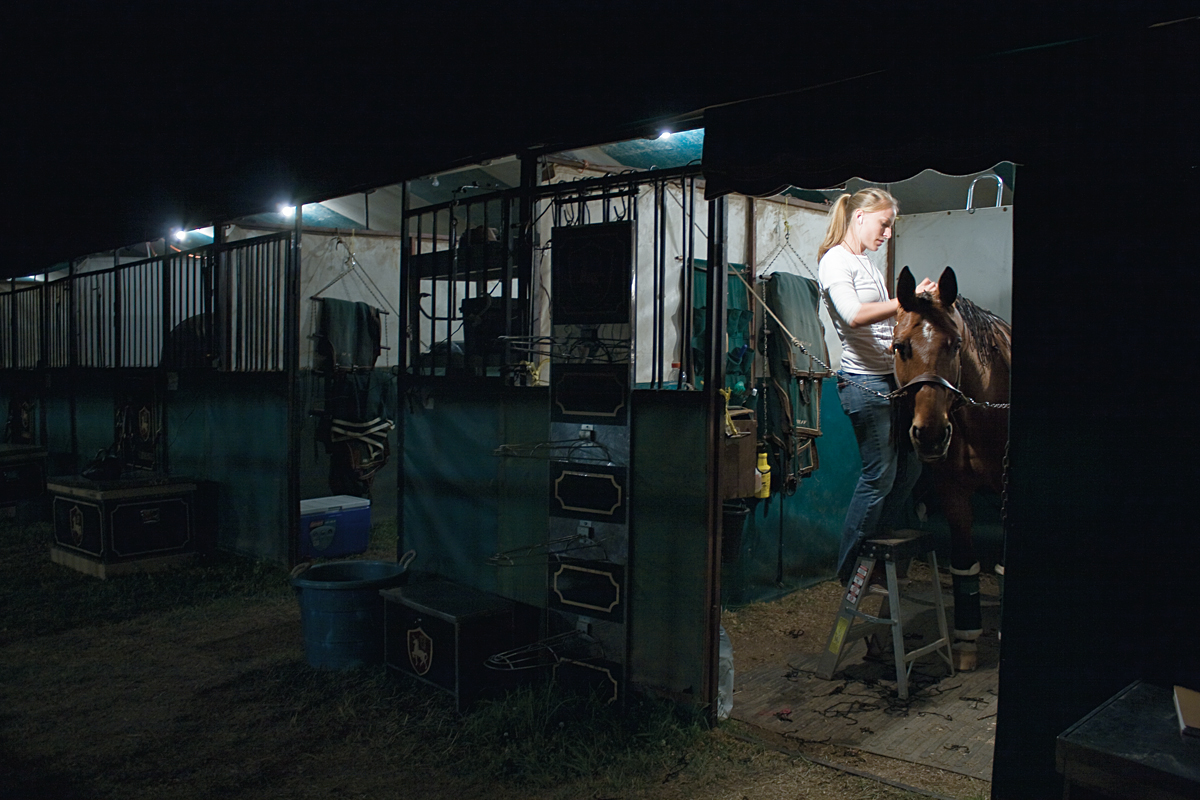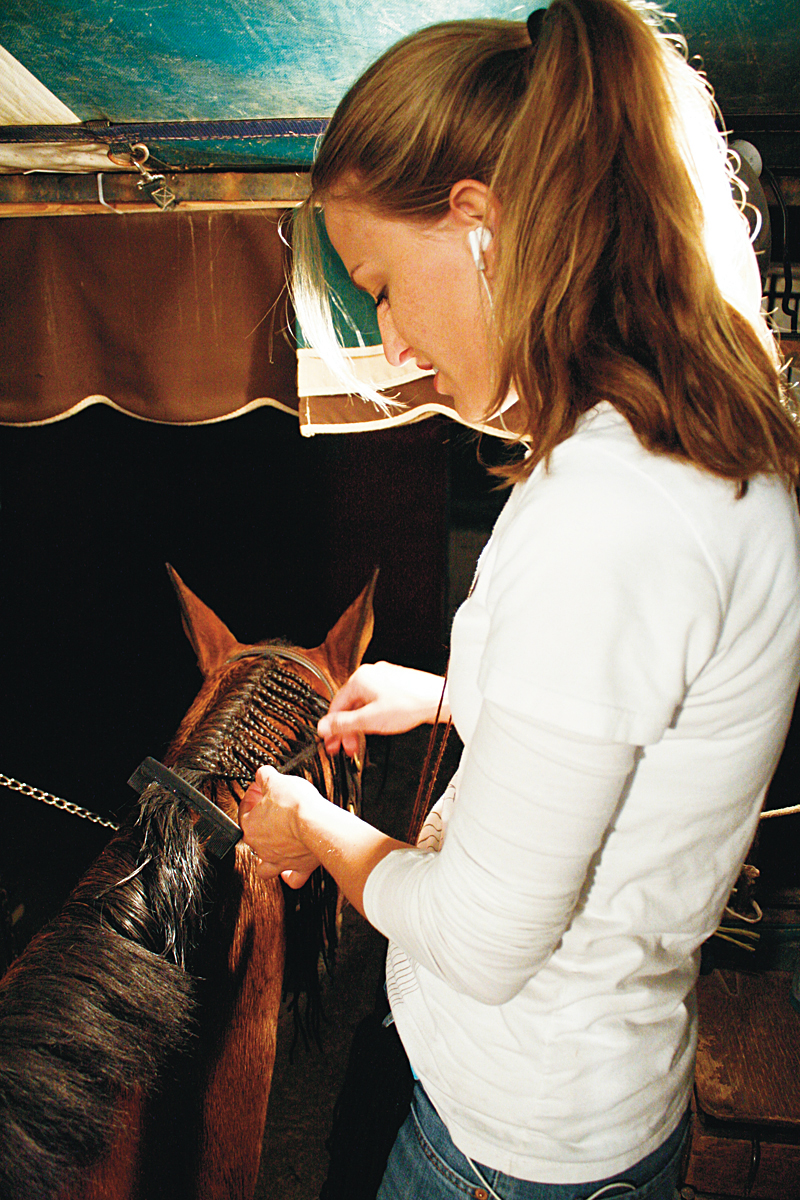In order to make a living, students sacrifice summer social lives
Story by Ryan Imondi & Alex Tomchak Scott
Photos by Dave Martinez and Sarabeth Oppliger
Jessica Stuhr emerges exhausted from the stable at 6 a.m. on a hot summer morning, the sun just peeking over the hills in the distance. A horse show will begin in a few hours, but Stuhr, who loves horses, won’t be there to see it. She’s been up the last ten hours, and soon she’ll be asleep.
Stuhr spent an entire summer’s worth of weekday nights like this. It was her job, playing a minute but lucrative role in horse shows up and down the west coast of North America. Stuhr braided horse hair, restraining their flowing manes in manageable ridges and collecting their tails into tidy ropes. Because of the hours and the nomadic lifestyle it forces upon her, Stuhr’s summer job can be an unpleasant one, but it’s worthwhile for a very important reason: money. A summer’s worth of braiding horse hair nets Stuhr, on average, $16,000, she estimates.
The extremely profitable short-term job, like Stuhr’s horse hair braiding gig, is its own subspecies of employment. Making that kind of money in such a brief period appears to require an exotic and fantastical skill or submission to a serious privation—punishing hours or extraordinary physical risks.
College students Jordan Ritchie and Chet Hill also work these types of jobs. Ritchie earned thousands of dollars to hold a fire extinguisher on an oilrig, and Hill made out equally well for taking measurements of dams. While these students get to return to school with a nice payoff, the benefit is not without costs.
Monotony, isolation, and even danger tend to be characteristic of such very gainful employment.
These students aren’t the only ones taking risks for the chance to make a quick profit. Reputedly, the most dangerous job in the United States is crabbing in Alaska: One crab fisherwoman or fisherman dies every week of the fishing season, on average. Despite those less-than-ideal odds, young men and women come from across the North American continent for two month-long crab seasons, piling onto grizzled but sturdy boats and motoring across churning, beyond-frigid seas, fishing up a five-figure mini-fortune in crustacean form. That, anyway, is the legend, encouraged and chronicled by the Discovery Channel’s Deadliest Catch, which ushered in a clade of media fixated upon the high-paying but unpleasant summer job. Deadliest Catch primarily follows the captains of these ships, but also depicts young men and women who claim to spend much of the year living off their earnings on the boats.
The show is the highest-rated program ever on the Discovery Channel. It is so successful, the Discovery Channel created, if not a media empire, then at least a respectable media fief to mine its popularity. The show generated a successful four-season spin-off that follows the captains when they are not fishing, three autobiographies by cast members, and a Deadliest Catch video game so successful its makers plan to release a sequel later this year.
An entire production company, ironically called Original Productions, sprung up around it, creating similar shows that follow Deadliest Catch’s theme. Lobster Wars. Lobstermen: Jeopardy at Sea. Swords (concerning the affairs of swordfishermen). Iditarod: Toughest Race on Earth. Ice Road Truckers, for which a movie is in the works. The Discovery Channel and the competing channel History snapped these programs up.
Jordan Ritchie, a twenty-two-year-old student at Oregon State University, is a frequent flier along the lucrative summer job route. A couple of years ago, he worked on an Alaskan fishing boat. More recently, he held a quixotic position on an oilrig. Through the endless sunshine of an Alaskan summer, he stood assisting a welder on the rig. He’s low-key about it now, but every time he worked, Ritchie held the lives of everyone on the rig in his hands, because his main job was to prevent fire, something terribly risky on oilrigs. This began with thorough fireproofing—he would enter the room where welding would be done, and cover all exposed cracks, crevices, and open areas.
After fireproofing, he would stand by while the welder worked, holding the extinguisher, waiting for a spark. A single spark, landing in the wrong place, can destroy an entire oilrig. If a spark caught fire, Jordan had only a few seconds to put it out with the fire extinguisher before everything went up in flames. However, in the end, he said, he never needed to use the extinguisher.
The hours were punishing. Ritchie worked a minimum of eighty-four hours a week, and often more than one hundred. The job was scheduled on a week-on, week-off basis, meaning Ritchie was supposed to have a week off for every one he worked, but in practice, it rarely played out like that. Sometimes, he says, he would work for as many as twelve days, then get only six without work.
Nevertheless, it was worthwhile. Ritchie sought out the oil industry for one reason. “It’s good money for a summer job—insanely good money—and I needed money for school,” he says. In the end, he made about $12,000 in one summer, he estimates.
Death defiance isn’t a duty of every bizarre and fruitful summer job. Chet Hill got $4,000 for spending three weeks surveying dams one summer, and the greatest danger posed to his life arose from his diet: a Sausage McMuffin for breakfast, a sandwich with potato chips for lunch.
Other than that, his only real nemesis was monotony. Hill, a senior at George Washington University, worked with a surveyors setting up tripods and taking readings to search for weaknesses in dams across Oregon. Three weeks of fourteen-hour days spent repetitively—interchangeable hotel rooms, interchangeable dams, the same co-worker, and no room for a social life.
Although Hill says the job is more boring than dangerous, it does require measurements of the whole dam in order to ensure that the dam has not moved. To take measurements from the base of the dam, Hill had to stand at the dam’s highest point, with his arm outstretched over a ten-story drop. One slide or misstep could have been fatal.
These types of jobs are worthwhile for the money, of course, but they could be good for something else too. Clarice Wilsey, the associate director of the University of Oregon’s Career Center, is often involved in setting students up with summer employment. Jobs such as Hill’s, Stuhr’s, and Ritchie’s can also boost long-term career prospects, she says. “Any work experience is valuable,” she says, because they build skills.
Hill’s job marks him out as a good listener, a good problem-solver. Stuhr’s time working with horses, Wilsey says, will telegraph “accuracy and attention to detail,” prized qualities to prospective employers. And physical stamina and concentration, which Ritchie demonstrated at his job, are highly valued, too.
Of course, similar qualities can also be developed in less exacting employment too. Most of the students Wilsey sees with summer jobs, she says, go into more conventional pursuits—coffee shops, clothing stores—and those can also yield skills, such as prized “people skills.”
“I don’t see that very often,” Wilsey says of Stuhr’s, Ritchie’s, and Hill’s jobs. “If they have a summer job that’s that lucrative, they probably would have to find it themselves.”
Stuhr has braided horse hair for five years. While she was working toward a degree in advertising at the University of Oregon, twenty-four-year-old Stuhr used the job’s summer windfall to feed, clothe, and house herself. Now that she has graduated, she plans to use it to pay off her student loans.
Horses, and a love of them, run in Stuhr’s family. “I’ve been riding my whole life,” she says. “My mom’s a [horse] trainer, so I’ve had horses in my life my whole life.” The love of horses manifested itself in a desire to show-jump competitively, but Stuhr had no horse of her own, so she had to resort to leasing horses from others. After a while, she hit on a fortuitous arrangement: A woman loaned her a horse to ride until it could gain experience. Most of the expenses of riding the horse would be provided, except for one: braiding.
Braiding a horse’s mane is a tradition that reaches back to old English fox-hunts to keep tree branches and leaves from getting tangled in the horse’s mane, Stuhr explains. Fox-hunting is the wild ancestor of the domesticated show-jump, or hunter-jumper sport, which presents many of the same situations horses would deal with in pursuit of foxes in artificial form.
Stuhr’s benefactor was not willing to provide braiding because braiding is expensive. An efficient braider can make about a dollar a minute for his, or more often her, work, which, for the horse-owner, adds up with a preponderance of shows. Stuhr didn’t have the money, so she was forced to learn braiding herself.
“For a long time, it was pretty crappy,” Stuhr says of her braiding. But after careful practice, she became versed enough in the art that other riders asked her to braid their horses as well.
When the horse she used returned to its owner, Stuhr gave up riding competitively for the most part. But she had an economic opportunity open to her: braiding. She says braiding is the most gainful part of horse-jumping. Her story is typical of most in the profession, as most come from within what she calls “the horse world,” growing up around horses, learning how to braid their hair for their own personal ends, and then going professional. This, she says, is desirable for horse-owners because those who grow up around horses know how to read them as well as braid their hair, and so they can tell, for instance, if a horse is sick. “We’re all horse people, so we know what the signs are.”
But most pursue braiding as a career, rather than temporary, seasonal employment, as Stuhr does. There is what she calls “an entourage of braiding women” with years of experience in the job who follow horse shows around.
“It’s just a weird life, and they work year-round,” Stuhr says. Many of her fellow braiders have no time to have families, as they live a nomadic life, going from show to show, and work red-eye shifts their entire careers. It’s not something Stuhr wants.
What of her most recent braiding earnings don’t go to pay for college will finance a trip to South and Central America. She hopes to write about the trip and eventually establish a career as a writer. Ultimately though, that career will lead her back to where she began.
“The only reason I want to go out and build a career,” she says, “is to have a horse and to ride it.”
Categories:
Following the Paycheck
September 26, 2010
unknown
Between unconventional hours and high-risk environments, three students with unusual summer jobs earn a quick and hefty buck.
Following the Paycheck
0
Donate to Ethos
Your donation will support the student journalists of University of Oregon - Ethos. Your contribution will allow us to purchase equipment and cover our annual website hosting costs.









